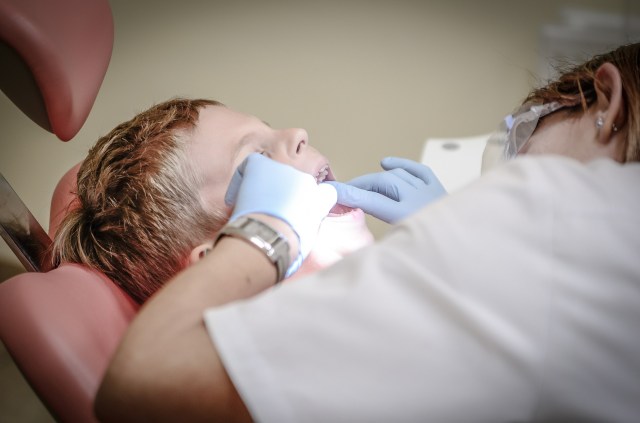The Academy of Pediatric Dentistry states that children should visit a pediatric dentist after their first tooth erupts or no later than his or her first birthday. This initial dental visit is valuable because you will learn how to care for those erupting baby teeth and your child will become familiar with the dentist, the sounds and smells of the dental office and what it’s like to have someone looking in his or her mouth.
By exposing your little one to these experiences early, you may prevent the onset of dentophobia—otherwise known as fear of the dentist. That said, the first visit may be challenging for you and your child. Use the tips below to make the visit a bit more enjoyable for everyone.
Read books about dental care.
Read books to your child about visiting the dentist. For example, “Going to the Dentist” by Anne Civardi and Scholastic’s “Brush, Brush, Brush!” book are both good choices. Since role-playing is a great way to familiarize your child with what occurs during a dental exam, consider taking turns mimicking what is happening. Even if your child is an infant, ask to look inside his or her mouth. Then, let your child look into yours.
Stay positive when talking about the dentist.
When you are speaking to your child about going to the dentist for the first time, avoid using any words that may cause anxiety. For example, it is best to avoid words such as needles, drill, hurt, scared and pain.
Help your child practice proper oral care.
If your child is too small to brush and floss, you can purchase an oral care kit that is designed specifically for little ones. The kit should contain a variety of mouth-cleaning tools to keep your baby’s teeth sparkling and gums healthy.
If you would rather not purchase a kit, a wet washcloth or piece of gauze wrapped around your finger and rubbed along the gums works well. However, once the first tooth erupts, a toddler-safe, soft-bristled toothbrush needs to be used twice daily. Until your dentist approves toothpaste, have your child brush with plain water.
Brush and floss with enthusiasm!
You can show your little one that oral care isn’t frightening by brushing and flossing enthusiastically. Be somewhat animated about it—make faces and squint your eyes—besides getting a laugh, you will be showing your child that taking care of your teeth can be fun.
Counter your child’s fears by remaining calm.
Children can easily read their parents’ emotions. Therefore, it is necessary that your child believes you are calm and relaxed, even if you are not. If you have dentophobia, you may want to ask your child’s other parent to bring him or her to the appointment. When this isn’t possible, speak with the pediatric dentist before the appointment. This information may be helpful as the dentist prepares for your child’s first visit.
Recognize the teeth and tongue during games.
Children love learning about parts of their bodies. For years, we have been teaching them to point to their noses, eyes, ears, belly buttons, etc. While these are all important parts of the body, the teeth and tongue are also essential. Add these to your list. Then, when the dentist asks to look at your child’s tongue, he or she can boldly stick it out.
Lead by example.
Primary teeth have a thinner layer of enamel than permanent teeth, which is why baby teeth are more susceptible to decay. As such, regular dental visits are crucial to maintaining the health of your child’s teeth and gums.
You can set a good example by consistently visiting your dentist. This consistency helps your child view going to the dentist for biannual checkups and cleanings in a more positive light.
While many believe the primary teeth are not as important as the secondary teeth, this is not the case. Even though these teeth are only in the mouth for a short time, their presence has a lasting effect on your child’s future dental needs.
The premature loss of a primary tooth leads to reduced space for the adult teeth, which ultimately results in crowding. Follow the above tips and your child’s first dentist visit can set him or her up for a lifetime of good oral health.











